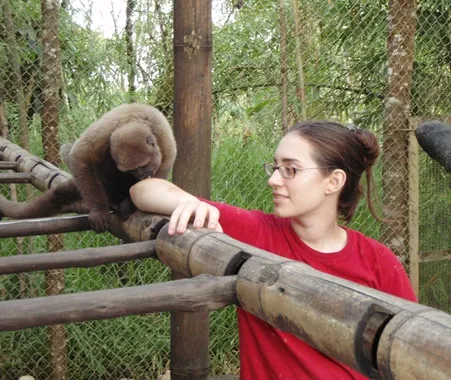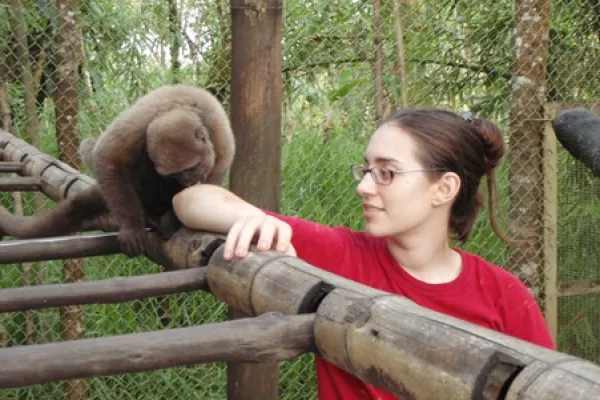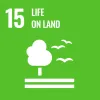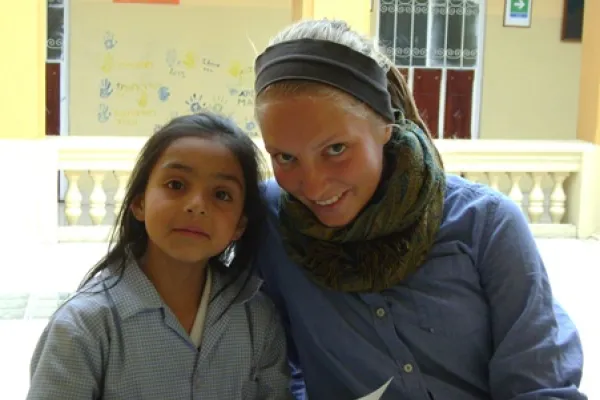Overview
Este proyecto está ubicado en la selva ecuatoriana y trabaja para rescatar, rehabilitar y cuando sea posible liberar animales a su entorno natural.
El centro trabaja en alianza con la Policía Ambiental del Ecuador (UPMA) y el Ministerio del Ambiente en la lucha contra el tráfico, maltrato, captura y caza de animales silvestres. Este centro está muy organizado y los voluntarios pueden ayudar con el cuidado de los animales y el mantenimiento.
Este proyecto fue fundado en 2006 con el objetivo de proteger la vida silvestre de la región amazónica a través del rescate y la rehabilitación de la flora y fauna local. Todos los animales del centro han sido maltratados, desatendidos o abandonados. Algunos de los animales quedaron huérfanos cuando sus padres fueron asesinados por cazadores, otros fueron rescatados de traficantes de animales que intentaban traficar con los animales fuera del país y muchos han sido recuperados de familias que los tenían en cautiverio. Lamentablemente, la mayoría ha sufrido algún tipo de abuso físico o psicológico.
Actualmente en el centro habitan al menos 40 especies diferentes de animales entre los que se incluyen: ocelotes, tayras, capibaras, loros, monos, tortugas y caimanes, entre otros.
El centro también está abierto a los turistas, que cobran una pequeña tarifa de entrada, que es la única fuente de ingresos del centro. Como el bienestar animal no es una prioridad para muchos ecuatorianos, se explica a los turistas la historia y el maltrato de cada animal, con la idea de educar a los visitantes locales y extranjeros sobre temas de protección animal. En general, las visitas no son guiadas, pero los turistas pueden leer sobre cada animal en el cartel informativo que hay en las jaulas.
Horario de trabajo voluntario
Horario de trabajo voluntario
El primer día, asistirás a una reunión de orientación en la que repasaremos las actividades planificadas para los próximos días. También será una oportunidad para hablar sobre tus expectativas y explorar tus talentos e intereses, asegurándote de que tu experiencia como voluntario tenga un impacto en el proyecto y sea satisfactoria a nivel personal.
Después de la orientación, te sumergirás en tus tareas. Ten en cuenta que cada día será diferente y que tus responsabilidades variarán según las necesidades diarias del proyecto. Valoramos tu flexibilidad y tu disposición para ayudar en lo que sea necesario. El almuerzo se proporciona en el sitio del proyecto de lunes a viernes, lo que te permite un descanso al mediodía. Después, continuarás con tu trabajo hasta aproximadamente las 5 p. m.
El resto del día lo tendrás libre para que lo disfrutes. Tu horario semanal generalmente seguirá el mismo patrón, con un horario de trabajo de 8:00 a 17:00 horas, de lunes a viernes. El coordinador te guiará hacia donde más te necesiten y también te animamos a que nos des cualquier idea que puedas tener.
Cada dos fines de semana, ya sea sábado o domingo, los voluntarios trabajarán algunas horas por la mañana para ayudar a alimentar a los animales. El resto del fin de semana es libre para explorar o relajarse.
Funciones y responsabilidades de los voluntarios
Funciones y responsabilidades de los voluntarios
Cada actividad contribuye al bienestar de los animales y al buen funcionamiento del centro de rescate de animales. Los voluntarios generalmente participan en las siguientes tareas:
Cuidado diario de los animales: Atender las necesidades diarias de los animales.
Preparación y alimentación de la dieta: cortar fruta, preparar dietas y alimentar a los animales.
Ayuda a los recién llegados: ayuda a los nuevos animales a adaptarse al centro.
Mantenimiento General: Encargarse de las tareas de mantenimiento y limpieza alrededor del centro.
Obras de Construcción: Reparación y construcción de nuevos recintos para mejorar las instalaciones
Actividades de enriquecimiento: Mejore las jaulas y los recintos para mantener a los animales entretenidos.
Entrenamiento: Entrenar a los animales que no pueden ser liberados para reducir el estrés, especialmente durante los controles médicos.
Asistencia veterinaria: Apoye al veterinario cuando sea necesario
Tareas adicionales: participar en la jardinería, mejorar senderos y crear señales para los visitantes.
Project Requirement
Project Requirement
Los voluntarios deben tener 18 años o más al momento de unirse al proyecto. Necesitas tener una mente abierta y una actitud flexible para trabajar en un entorno nuevo y diferente. El voluntario debe aportar energía y entusiasmo para marcar la diferencia. Los participantes deben estar en forma y saludables al momento de unirse al programa y deben estar preparados para trabajar al aire libre y ensuciarse las manos. Los participantes en el programa deben tener un gran interés y amor por el trabajo de conservación de animales. Los participantes no deben tener condenas penales y deben proporcionar un informe limpio de verificación de antecedentes penales.
Schedule a Google Meet with a Program Advisor
Interested in our programs? We're here to provide expert guidance
- Get Detailed Info
- 20 min One -on-One meeting
- Get expert advise
- Application Guidance
Photo Gallery
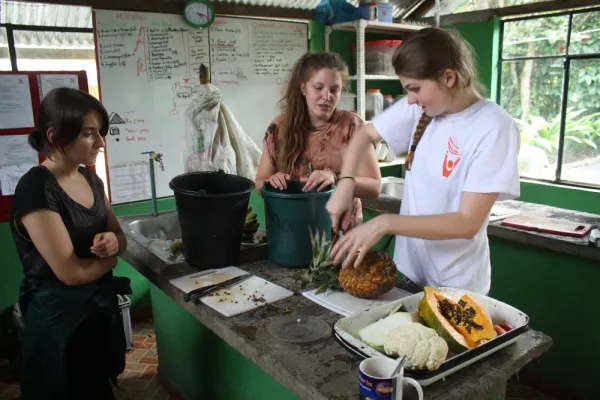
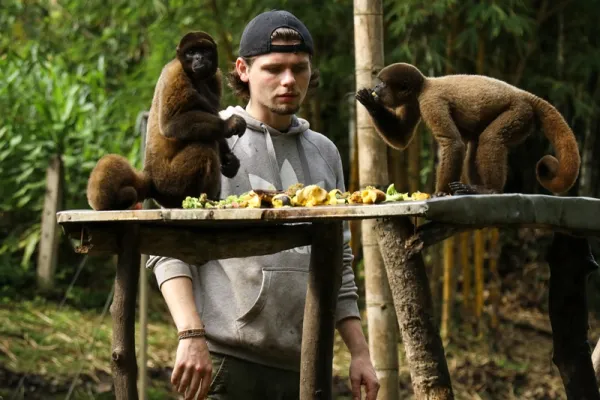
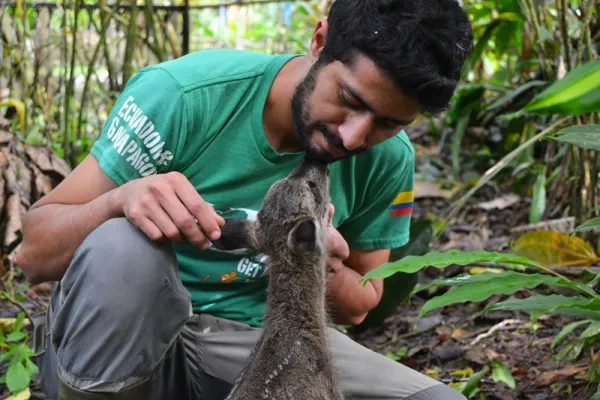
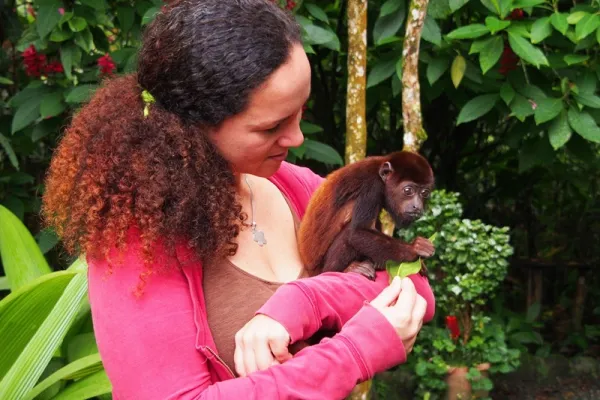
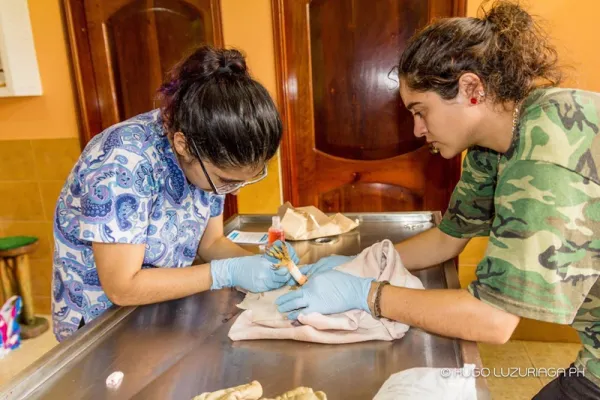
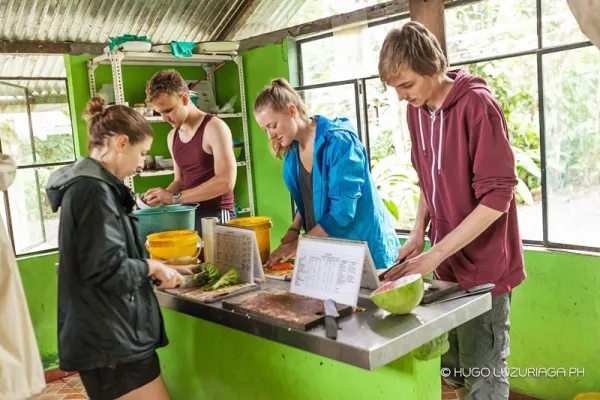
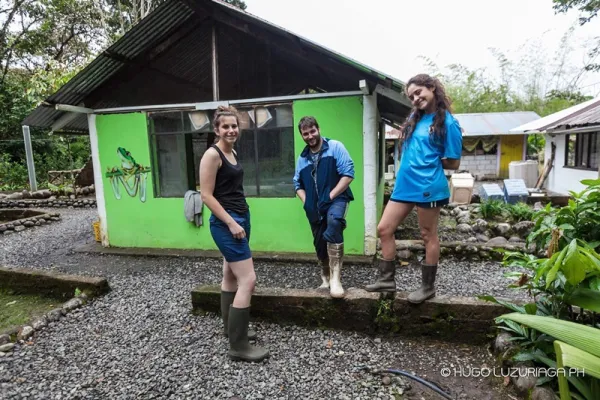
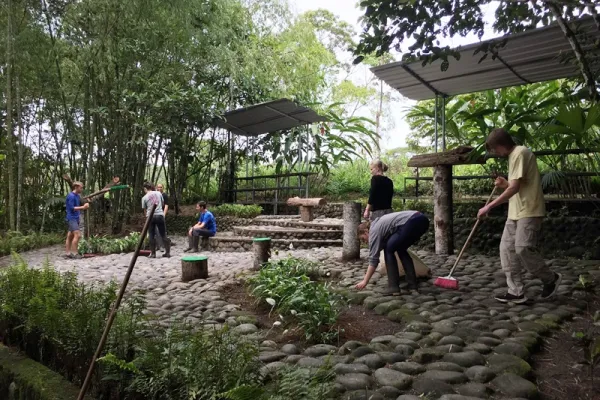
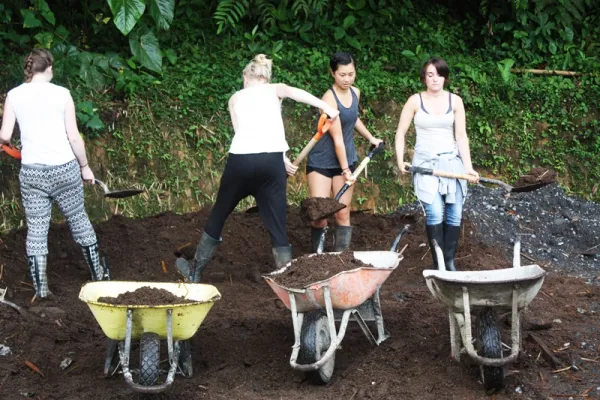


Living
Living
Volunteering Solutions es un nombre establecido para las colocaciones de voluntariado en el extranjero. Nos aseguramos de que todos nuestros alojamientos y estándares de vida coincidan con los requisitos y niveles de comodidad de nuestros voluntarios.
Transferencia de aeropuerto
Los voluntarios serían recogidos en el Aeropuerto Internacional Mariscal Sucre por el personal de VolSol o el coordinador en el país. Los voluntarios que ya están presentes en Quito pueden llegar directamente a la casa de voluntarios.
Alojamiento
A su llegada a Quito, los voluntarios reciben alojamiento para pasar una noche en la casa de voluntarios. Después de la transferencia al proyecto en Puyo, los voluntarios se alojan en el sitio en cabañas compartidas. Hay cabañas para voluntarios con dormitorios que ofrecen espacio para hasta 14 personas en total. Hay una cocina compartida, baño y área social con TV y reproductor de DVD, hamacas y libros. Se le proporcionará ropa de cama e incluso tendrá acceso a una piscina y wi-fi.
Orientación
Nuestro personal local brindará una sesión de orientación integral para los voluntarios. La orientación cubriría información sobre su proyecto y otra información esencial.En el lugar, el personal del programa presentará al voluntario el proyecto y el personal del proyecto local y lo ayudará con la inducción básica.
Comidas
Los voluntarios reciben tres comidas por día desde el lunes por la mañana hasta el almuerzo del sábado. Fuera de este horario, los voluntarios pueden disfrutar de una comida en el cercano Puyo o preparar la comida en la cocina comunitaria. Se espera que los voluntarios ayuden y contribuyan en las actividades de cocina y limpieza también. Los voluntarios también pueden hacer viajes a la ciudad local para comprar alimentos/bocadillos adicionales.
Durante tu tiempo libre
Mientras están en el proyecto durante el tiempo libre, los voluntarios socializan principalmente con otros voluntarios. Wi-Fi está disponible para los voluntarios durante su tiempo libre también. Durante los fines de semana, para viajar a Quito u otros lugares, los voluntarios pueden tomar un taxi hasta la estación de autobuses ("El terminal") y tomar un autobús desde allí.
Dates
Dates
January
04
11
18
25
February
01
08
15
22
March
01
08
15
22
29
April
05
12
19
26
May
03
10
17
24
31
June
07
14
21
28
July
05
12
19
26
August
02
09
16
23
30
September
06
13
20
27
October
04
11
18
25
November
01
08
15
22
29
December
06
13
20
27
January
03
10
17
24
31
February
07
14
21
28
March
07
14
21
28
April
04
11
18
25
May
02
09
16
23
30
June
06
13
20
27
July
04
11
18
25
August
01
08
15
22
29
September
05
12
19
26
October
03
10
17
24
31
November
07
14
21
28
December
05
12
19
26
Available
Filling Fast
Booked Out
Costs
| Duration |
Program Fee
|
Choose your currency
|
|---|---|---|
| 2 Weeks | $890 | |
| 3 Weeks | $1090 | |
| 4 Weeks | $1300 | |
| 5 Weeks | $1510 | |
| 6 Weeks | $1680 | |
| 7 Weeks | $1910 | |
| 8 Weeks | $2099 | |
| Extra Week | $230 |
Please Note: An application fee of is charged over and above the program fee as an application payment. A 5% international banking fee is charged for credit card payments of program fee in USD/AUD.
¿Qué estás pagando?
- Recogida en el aeropuerto de Quito
- Una noche de alojamiento en hostal en Quito
- Alojamiento en el Proyecto en Puyo
- Guía de información previa a la salida
- Orientación
- Apoyo del personal local
- Todas las comidas entre semana
- Traslado a Terminal de Buses en Quito para viajar a Puyo
¿Qué NO está incluido?
- Vuelos
- Traslado de regreso al aeropuerto de Quito
- Traslado de regreso del proyecto a Quito
- Comidas los fines de semana
- gastos personales
- Costo del boleto de bus de Quito a Puyo
FAQ's
Application and Program Details
-
Are there any necessary requirements to participate in the Quito Volunteering Projects?
-
Below are the necessary requirements to participate in the Quito volunteering projects:
Intermediate or Beginner Level of Spanish is required.
Volunteers must be 18 years or older at the time of joining the project.
Participants must have a Clean Police Record (Criminal Background Check).
Volunteers need to have an open mind and flexible attitude for working in a new and different environment.
The volunteers should bring energy and enthusiasm to make a difference. -
Can I volunteer as part of a group?
-
Yes, you must volunteer in a group. In fact volunteering in a group has its own perks. You can get discounts on application fee and you can pool in for add-on tours and travel.
-
When should I apply for the volunteer programs in Quito, Ecuador?
-
We always recommend all our volunteers to apply in advance. This way they get time to prepare better for the trip. Applying in advance has perks like:
-Confirmed booking/placement.
-Application Fee is valid for a year and you can choose to do two three programs in the same year without paying an additional application fee.
-You can make the payment for program fee in parts.
Also, we abide by the first come first serve policy. -
When do I need to arrive in Quito, Ecuador for my program? What will happen once I arrive in Ecuador?
-
Arrival dates for all projects in Ecuador are on Saturdays. Once you land in Quito, you would be picked up by one of the Volunteering Solutions’ staff and you would be given a general induction. The volunteer coordinator will brief you about the history of the program, what the project currently is involved in, additional projects that might be going on at that time that volunteers can participate in, additional safety information, information on what to do during your free time, information on how to get there and around at the project. This is all presented in a booklet format and lasts +/- 30 minutes per volunteer.
On the first day of the project, our volunteer coordinator accompanies the volunteer to his/her project and shows how public transport works to and from the project. On the site, the coordinator will introduce the volunteer to the project and the local project staff and help with basic induction.
-
How long will it take to process my application? Will my application be accepted?
-
Usually, it takes around 10-12 working days for the application to be processed and placement to be confirmed. After the application is accepted, your placement document shall be updated in your account online and you can view the information in your account. The application acceptance depends on the availability of seats in the project as well as the eligibility criteria of the program (age, skills and experience etc.).
Flights and Visa
-
What are the recommended airlines to fly to Quito, Ecuador?
-
From the US to Quito, the recommended services are:
American
Avianca
Aeromexico
From Europe to Quito, the recommended services are:
Iberia
Taca
KLM -
What are the Visa requirement and process to go to Quito, Ecuador?
-
No matter wherever you travel to, make sure that your passport is valid for at least another 6 months upon arrival to that place. That is applicable for Ecuador too. On your arrival in Ecuador, you will get a T-3 Visa stamp. This Visa stamp is valid for 90 days. If you plan to stay longer than this, you should apply for 12-IX Visa at the Ecuadorian Embassy of your home country, before leaving. This Visa would be valid for 180 days then.
Accommodation and Living
-
Can I know more about accommodation and food arrangements?
-
For accommodation, volunteers can choose to stay either with a local host family or in the volunteer’s hostel. Both the accommodation options are fully furnished and provide a comfortable stay to volunteers.
In Volunteer house, there is the provision of the fully functional kitchen but no meals. Volunteers can prepare meals for themselves. Meals are provided by the host family, thrice a day. -
For how many hours do I have to volunteer in a day?
-
Volunteers usually work for 5 to 6 hours a day depending on their program. You will have the weekend off so you can go to travel on weekends. However, volunteers need to be flexible, open-minded and understand that work requirements can change as well on certain occasions.
-
Can vegetarians be accommodated?
-
Yes, however, you must inform us in advance and also mention about any dietary requirement in your application form.
-
Where can I change my money in Quito? Are there ATMs in Quito?
-
You will find a number of currency exchange counters and ATMs in the airport as well as the popular tourist areas of Quito. Your pre-departure booklet will have this information, your coordinator would also guide you with this information.
-
Would I have free time during my program? Can I do sightseeing during my program?
-
Volunteers typically work for around 5-6 hours in a day. Depending on the workload every day, working hours can vary. Evenings are free for the volunteers and volunteers usually get together and go out for social gatherings, eat out or just relax at the volunteer house. Quito offers a number of activities and attractions for the discerning travelers. Quito is surrounded by Cotopaxi volcano and Pichincha, Antizana, Cayambe volcanoes that make the Andean contour. Full of churches and majestic architecture and exquisite fine dining experiences, walking tour in this beautiful city is not enough. Galapagos is at a distance of half an hour from the mainland Quito by air and you can go crazy looking and experience the untouched wilderness there. Island hopping, swimming, and snorkeling are just a few of the perks!
-
How do I get to the program location?
-
A member of the local coordinating team will take you to your placement and introduce you to your project after giving you a basic orientation about the program/city/culture etc. You will be told about the directions to the project from your accommodation and the mode of transport you can use.
-
Are there more expenses once I arrive in Quito, Ecuador?
-
Your program fee covers your Airport Pickup, Accommodation, Food and In-country Support.
You will need to cover yourself for your personal expenses, such as local transport, telephone, the internet, shopping, weekend trips etc. However, you should carry around $50 per week for your basic personal expenses. This amount can vary and you would need a higher amount if you go on weekend sightseeing tours.
Health and Safety
-
Do I need to buy health insurance?
-
Yes, for all participants it is mandatory to have a travel medical insurance.Volunteers have the option to purchase Travel and Medical Insurance at a nominal extra cost from Volunteering Solutions. To provide the best option to our participants, we offer comprehensive insurance coverage in collaboration with a leading insurance provider.
-
How safe is Quito, Ecuador?
-
Safety is a concern for all the international travelers; however, Quito is a tourist friendly country and major incidents involving volunteers is unheard of. Both the accommodation of Host family and the Volunteer house are safe. Although, when you venture out for a visit try to be with your group. Consult your coordinator before you decide to wander alone, especially in the night.
Here are some guidelines from the project:
When using public transport keep your bag and valuables with you and not on the shelves or under the seat.
Do not bring things which are not required or are extremely expensive: jewelry, credit cards, more money than you're spending money for that day, etc.
When it gets dark, take a taxi, they are cheap here in Ecuador and will guarantee you a safe ride home.
Do not drink in the company of the strangers, until you are with your volunteer group or company. -
What immunizations/vaccinations will I need?
-
You must visit your doctor 2 months prior to your overseas travel. As a precaution, carry your yellow fever certificate and vaccinations booklet to be produced at the border crossings, if need be.
Connect with Past Volunteers
-
How can I connect with past Volunteering Solutions Ecuador alumni as well as other former and current volunteers?
-
We encourage volunteers to get in touch with former Volunteering Solutions Quito program participants and also other program participants joining our projects. You are recommended to join the Volunteering">https://www.facebook.com/VolunteeringSolutions/">Volunteering Solutions Facebook Page orhttps://www.facebook.com/groups/VolunteeringSolutions/">; Facebook Group to communicate with other participants.
To read alumni interviews from past participants, visit the Meet">https://www.volunteeringsolutions.com/meet-a-volunteer">Meet a Volunteer section on our website.


























